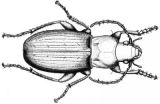(Press-News.org) Don't get mad the next time you catch your teenager texting when he promised to be studying.
He simply may not be able to resist.
A University of Iowa study found teenagers are far more sensitive than adults to the immediate effect or reward of their behaviors. The findings may help explain, for example, why the initial rush of texting may be more enticing for adolescents than the long-term payoff of studying.
"The rewards have a strong, perceptional draw and are more enticing to the teenager," says Jatin Vaidya, a professor of psychiatry at the UI and corresponding author of the study, which appeared online this week in the journal Psychological Science. "Even when a behavior is no longer in a teenager's best interest to continue, they will because the effect of the reward is still there and lasts much longer in adolescents than in adults."
For parents, that means limiting distractions so teenagers can make better choices. Take the homework and social media dilemma: At 9 p.m., shut off everything except a computer that has no access to Facebook or Twitter, the researchers advise.
"I'm not saying they shouldn't be allowed access to technology," Vaidya says. "But they need help in regulating their attention so they can develop those impulse-control skills."
In their study, "Value-Driven Attentional Capture in Adolescence," Vaidya and co-authors Shaun Vecera, a professor of psychology, and Zachary Roper, a graduate student in psychology, note researchers generally believe teenagers are impulsive, make bad decisions, and engage in risky behavior because the frontal lobes of their brains are not fully developed.
But the UI researchers wondered whether something more fundamental was going on with adolescents to trigger behaviors independent of higher-level reasoning.
"We wanted to try to understand the brain's reward system and how it changes from childhood to adulthood," says Vaidya, who adds the reward trait in the human brain is much more primitive than decision-making. "We've been trying to understand the reward process in adolescence and whether there is more to adolescent behavior than an under-developed frontal lobe," he adds.
For their study, the researchers recruited 40 adolescents, ages 13 and 16, and 40 adults, ages 20 and 35. First, participants were asked to find a red or green ring hidden within an array of rings on a computer screen.
Once identified, they reported whether the white line inside the ring was vertical or horizontal. If they were right, they received a reward between 2 and 10 cents, depending on the color.
For some participants, the red ring paid the highest reward; for others, it was the green. None was told which color would pay the most.
After 240 trials, the participants were asked whether they noticed anything about the colors. Most made no association between a color and reward, which researchers say proves the ring exercise didn't involve high-level, decision-making.
In the next stage, participants showed they had developed an intuitive association when they were asked to find a diamond-shaped target. This time, the red and green rings were used as decoys.
At first, the adolescents and adults selected the color ring that garnered them the highest monetary reward, the goal of the first trial. But in short order, the adults adjusted and selected the diamond. The adolescents did not.
Even after 240 trials, the adolescents were still more apt to pick the colored rings.
"Even though you've told them, 'You have a new target,' the adolescents can't get rid of the association they learned before," Vecera says. "It's as if that association is much more potent for the adolescent than for the adult.
"If you give the adolescent a reward, it will persist longer," he adds. "The fact that the reward is gone doesn't matter. They will act as if the reward is still there."
Researchers say that inability to readily adjust behavior explains why, for example, a teenager may continue to make inappropriate comments in class long after friends stopped laughing.
In the future, researchers hope to delve into the psychological and neurological aspects of their results.
"Are there certain brain regions or circuits that continue to develop from adolescence to adulthood that play role in directing attention away from reward stimuli that are not task relevant?" Vaidya asks. "Also, what sort of life experiences and skill help to improve performance on this task?"
INFORMATION:
The study was funded by the University of Iowa's Social Sciences Funding Program.
Sometimes, adolescents just can't resist
University of Iowa study finds teenagers are far more sensitive than adults to the immediate effect or reward of their behaviors
2014-09-11
ELSE PRESS RELEASES FROM THIS DATE:
Satellite view of newborn Atlantic Tropical Depression 6
2014-09-11
The sixth tropical depression of the Atlantic Ocean Hurricane Season formed in the Eastern Atlantic Ocean and NOAA's GOES-East satellite captured it.
A visible image of Tropical Depression 6 was taken by NOAA's GOES-East satellite at 7:45 a.m. EDT on September 11 as it developed. The image was created by NASA/NOAA's GOES Project at the NASA Goddard Space Flight Center in Greenbelt, Maryland.
In addition to using GOES imagery and data from other NOAA and NASA satellites, The National Hurricane Center also uses measurements from the Advanced Scatterometer or ASCAT instrument ...
NJIT researchers working to safeguard the shoreline
2014-09-11
An NJIT research team has estimated the total mass of oil that reached the Gulf of Mexico shore in the wake of the BP Deepwater Horizon blowout. It's the first time such an estimate was reported, and the study is published in the August issue of Environmental Science and Technology.
The researchers found that 22,000 tons of oil reached the Gulf shoreline in 2010. This finding will help officials determine the persistence of oil on the shore and identify potential harm to the ecosystem.
The study was conducted by the Center for Natural Resources Development and Protection ...
Penn Medicine bioethicists call for greater first-world response to Ebola outbreak
2014-09-11
PHILADELPHIA – Amid recent discussion about the Ebola crisis in West Africa, Penn Medicine physicians say that high-income countries like the United States have an obligation to help those affected by the outbreak and to advance research to fight the deadly disease — including in the context of randomized clinical trials of new drugs to combat the virus. The two new editorials, which will appear "online first" in JAMA on September 11th, are written by faculty members in the Perelman School of Medicine at the University of Pennsylvania and the Department of Social Science, ...
Unusual host preference of a moth species could be useful for biological control
2014-09-11
A team of Iranian researchers from the Rice Research Institute of Iran have discovered that Gynnodomorpha permixtana, a well-known moth species from Europe and Asia, has changed its host preferences in order to adjust to Iran's northern region environmental conditions. The importance of this adaptation for biological control of problematic weeds in rice fields and the biology of the moth on new host plant have been described in the open access journal Nota Lepidopterologica.
The larvae of G. permixtana have been so far reported to feed on the seeds and flowers of plant ...
Ebola paper demonstrates disease transmission rate
2014-09-11
Sept. 11, 2014 - New research from Arizona State University and the University of Tokyo that analyzes transmission rates of Ebola in West African countries shows how rapidly the disease is spreading.
Researchers Gerardo Chowell-Puente, ASU School of Human Evolution and Social Change Associate Professor, and Hiroshi Nishiura of the University of Tokyo found that transmission rates for each single case of Ebola consistently showed at least one new case of the disease being transmitted. Country-specific analysis of transmission rates in Liberia and Sierra Leone showed on ...
Some male scientists willing to forsake careers for family
2014-09-11
One third of men in academic science are willing to scale back their careers to focus on family life, according to researchers.
While traditional fatherhood roles may be shifting, men in the male-dominated field of academic science, such as physics and biology, face significant challenges in trying to balance work and family life, said Sarah Damaske, assistant professor of labor and employment relations and sociology, Penn State. The majority of men studied spoke of the pull of fatherhood and a desire to spend more time with children, yet they also acknowledged that academic ...
Not enough vitamin B1 can cause brain damage
2014-09-11
MAYWOOD, Ill – (Sept. 11, 2014) A deficiency of a single vitamin, B1 (thiamine), can cause a potentially fatal brain disorder called Wernicke encephalopathy.
Symptoms can include confusion, hallucinations, coma, loss of muscle coordination and vision problems such as double vision and involuntary eye movements. Untreated, the condition can lead to irreversible brain damage and death, according to neurologists at Loyola University Medical Center.
In the developed world, Wernicke encephalopathy typically occurs in people who have disorders such as alcoholism and anorexia ...
Investigators from Montefiore and Einstein to present data at 2014 ASTRO Meeting
2014-09-11
NEW YORK (September 10, 2014) – Members of the Department of Radiation Oncology at Montefiore Einstein Center for Cancer Care (MECCC) and Albert Einstein College of Medicine of Yeshiva University's NCI–designated Albert Einstein Cancer Center will present new study findings at the 56th Annual Meeting of the American Society for Radiation Oncology (ASTRO) revealing the impact socioeconomic status has on radiation treatment compliance, predictive indicators for clinical outcomes and on radiation therapy duration and dosing recommendations. ASTRO is being held September 14 ...
Two new species of carabid beetles found in Ethiopia
2014-09-11
There are more than 150 species of beetles in the genus Calathus, 17 of which have only been found in the mountains of the Ethiopian Highlands. Now scientists have found two new ones — Calathus juan and Calathus carballalae — and have described them in Annals of the Entomological Society of America.
C. juan is named for Juan Novoa, the son of one of the authors, in recognition of his help on various beetle-collecting expeditions. Adults are black and shiny, and are 9.5-11.5 millimeters long. It was found under stones at the base of giant, tree-like plants called lobelias ...
How salt causes buildings to crumble
2014-09-11
This news release is available in German. Historic stone buildings are tourist magnets. The Jordanian rock city of Petra, the medieval town of Rhodes in the Aegean Sea and the sandstone temples at Luxor, Egypt, for example, attract hundreds of thousands of visitors each year. These cultural assets all have one thing in common: they suffer from weathering caused by salts. These crystallise inside the porous building materials and generate enough force for the stone to break or crumble. The same problem also occurs in concrete buildings in this country.
Researchers at ...
LAST 30 PRESS RELEASES:
Nutrient uptake gets to the root of roots
Aspirin not a quick fix for preventing bowel cancer
HPV vaccination provides “sustained protection” against cervical cancer
Many post-authorization studies fail to comply with public disclosure rules
GLP-1 drugs combined with healthy lifestyle habits linked with reduced cardiovascular risk among diabetes patients
Solved: New analysis of Apollo Moon samples finally settles debate about lunar magnetic field
University of Birmingham to host national computing center
Play nicely: Children who are not friends connect better through play when given a goal
Surviving the extreme temperatures of the climate crisis calls for a revolution in home and building design
The wild can be ‘death trap’ for rescued animals
New research: Nighttime road traffic noise stresses the heart and blood vessels
Meningococcal B vaccination does not reduce gonorrhoea, trial results show
AAO-HNSF awarded grant to advance age-friendly care in otolaryngology through national initiative
Eight years running: Newsweek names Mayo Clinic ‘World’s Best Hospital’
Coffee waste turned into clean air solution: researchers develop sustainable catalyst to remove toxic hydrogen sulfide
Scientists uncover how engineered biochar and microbes work together to boost plant-based cleanup of cadmium-polluted soils
Engineered biochar could unlock more effective and scalable solutions for soil and water pollution
Differing immune responses in infants may explain increased severity of RSV over SARS-CoV-2
The invisible hand of climate change: How extreme heat dictates who is born
Surprising culprit leads to chronic rejection of transplanted lungs, hearts
Study explains how ketogenic diets prevent seizures
New approach to qualifying nuclear reactor components rolling out this year
U.S. medical care is improving, but cost and health differ depending on disease
AI challenges lithography and provides solutions
Can AI make society less selfish?
UC Irvine researchers expose critical security vulnerability in autonomous drones
Changes in smoking status and their associations with risk of Parkinson’s, death
In football players with repeated head impacts, inflammation related to brain changes
Being an early bird, getting more physical activity linked to lower risk of ALS
The Lancet: Single daily pill shows promise as replacement for complex, multi-tablet HIV treatment regimens
[Press-News.org] Sometimes, adolescents just can't resistUniversity of Iowa study finds teenagers are far more sensitive than adults to the immediate effect or reward of their behaviors



